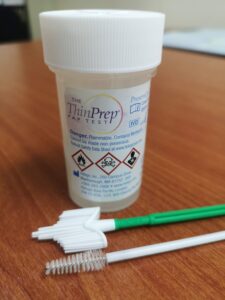 Health screening as a person ages is especially important. It should be your top priority even if you are healthy. In women, this will include a visit to the gynaecologist’s clinic and will help in identifying if the woman has increased risks for developing a disease or already has the disease or condition that was not previously known about. Early identification of risks factors can help in counselling and instituting remedial or preventive measures to reduce that risk. This may in fact help to prevent the disease from occurring. Likewise, early detection of disease and starting treatment as soon as possible will results in a better outcome and lower the risks of complications. For example, many women with ovarian cancer do not have symptoms until it is too late. However, prompt diagnosis at an early stage of ovarian cancer will give excellent outcome with surgery alone and may not even need chemotherapy at all.
Health screening as a person ages is especially important. It should be your top priority even if you are healthy. In women, this will include a visit to the gynaecologist’s clinic and will help in identifying if the woman has increased risks for developing a disease or already has the disease or condition that was not previously known about. Early identification of risks factors can help in counselling and instituting remedial or preventive measures to reduce that risk. This may in fact help to prevent the disease from occurring. Likewise, early detection of disease and starting treatment as soon as possible will results in a better outcome and lower the risks of complications. For example, many women with ovarian cancer do not have symptoms until it is too late. However, prompt diagnosis at an early stage of ovarian cancer will give excellent outcome with surgery alone and may not even need chemotherapy at all.
Many women feel nervous or even afraid to see the gynaecologist, especially if it is their first visit. Seeing a gynaecologist is just like seeing any other doctor in other specialities such as your dentist or general practitioner. They are there to help you and you should take this as an opportunity to seek their help in taking care of your health.
Reasons to visit the gynaecologist
- For health screening related to women’s health. This is important even though you are currently healthy.
- Seeking advice related to fertility, family planning and other reproductive health issues.
- Treatment or follow-up for gynaecological disorders.
- Seeking advice or treatment of issues related to sexual dysfunction.
When to schedule
 For gynaecological health screening, it is best to schedule it when you are not having your menses. You can of course see the gynaecologist at any time if you have an issue that needs urgent treatment.
For gynaecological health screening, it is best to schedule it when you are not having your menses. You can of course see the gynaecologist at any time if you have an issue that needs urgent treatment.
What to prepare
 It is good to prepare some questions beforehand about women health issues you are uncertain about. It can also be specific questions related to your fertility or menstrual cycles. Discuss these with your gynaecologist. You should not be shy during the consultation and should not worry about the doctor judging you. Doctors are trained to be non-judgemental and you should be honest with the doctor whenever a question is raised.
It is good to prepare some questions beforehand about women health issues you are uncertain about. It can also be specific questions related to your fertility or menstrual cycles. Discuss these with your gynaecologist. You should not be shy during the consultation and should not worry about the doctor judging you. Doctors are trained to be non-judgemental and you should be honest with the doctor whenever a question is raised.
It will be good as well if you can go through your medical and family history prior to your visit. You should also go through your medications or any other supplements or herbs that you are currently taking and list them all down.  The gynaecologist will be asking you about these histories. If it is too detailed or complicated, it will be a great help if you can prepare a summary in a printed form and bring it during your visit to the gynaecologist. This ensures complete and accurate information is conveyed to the doctor. You are expected also to give a summary of your menstrual cycles pattern and the date of your last menstrual period.
The gynaecologist will be asking you about these histories. If it is too detailed or complicated, it will be a great help if you can prepare a summary in a printed form and bring it during your visit to the gynaecologist. This ensures complete and accurate information is conveyed to the doctor. You are expected also to give a summary of your menstrual cycles pattern and the date of your last menstrual period.
You may want to bring panty liners because you may have some per vaginal staining after the Pap smear test. It is advisable to wear clothes that are comfortable and easy to slip off especially if you are required to do the pelvic examination or the Pap smear test.
During the visit
 General examination will be performed and then the gynaecologist may recommend further examinations depending upon your condition. Remember, an accurate diagnosis can only be made if the doctor has complete knowledge of your medical history and the clinical examination.
General examination will be performed and then the gynaecologist may recommend further examinations depending upon your condition. Remember, an accurate diagnosis can only be made if the doctor has complete knowledge of your medical history and the clinical examination.
A visit to the gynaecology clinic means that you are probably going to need a pelvic examination and a Pap smear. If you have never been sexually active before, the doctor will skip this part of the examination.
 A bedside ultrasound scan of the pelvis is usually performed to assess the pelvic organs such as the uterus and the ovaries. The ultrasound scan can detect the presence of ovarian cysts or fibroids. A full bladder may be required for the ultrasound scan.
A bedside ultrasound scan of the pelvis is usually performed to assess the pelvic organs such as the uterus and the ovaries. The ultrasound scan can detect the presence of ovarian cysts or fibroids. A full bladder may be required for the ultrasound scan.
For those who are sexually active, you may take this opportunity to discuss family planning and prevention of sexually transmitted infections (STI). If there is risk factors such as symptoms or has more than one sexual partners, screenings for sexually transmitted infections (STI) are highly recommended.
Screening for cervical cancer is usually part of a woman’s health check-up. This is indicated in women who are already sexually active. There are two types of tests: the Pap smear (Thin Prep or Sure Prep) test and the HPV (human papilloma virus) test. For both, the doctor will collect cells from the surface of the cervix with a special brush. The Pap smear test looks for abnormal cells from the cervix before it becomes cancerous. The HPV test will look for the presence of the virus. HPV is a virus that spreads through sexual contact. Presence of HPV virus in the cervix will increase your cervical cancer risk.
 For the test, you will need to lie down on the examination couch. An instrument called a speculum will be gently inserted into your vagina so that the cervix can be visualised. The specimen will be collected from the cervix with a small brush. Cervix screening is not usually painful but can be uncomfortable. You must try to relax and should not tense your pelvic muscles. You should give feedback and tell the doctor whenever you are uncomfortable during this procedure. An adjustment can then be made to make it much more tolerable. This usually takes only a few minutes to complete. The results will be ready in 1 to 2 weeks. If there are any abnormal cells present, your doctor will contact you to discuss the next step to take.
For the test, you will need to lie down on the examination couch. An instrument called a speculum will be gently inserted into your vagina so that the cervix can be visualised. The specimen will be collected from the cervix with a small brush. Cervix screening is not usually painful but can be uncomfortable. You must try to relax and should not tense your pelvic muscles. You should give feedback and tell the doctor whenever you are uncomfortable during this procedure. An adjustment can then be made to make it much more tolerable. This usually takes only a few minutes to complete. The results will be ready in 1 to 2 weeks. If there are any abnormal cells present, your doctor will contact you to discuss the next step to take.
Further investigation may be required, such as urine or blood tests. This will depend on your medical history and clinical findings at the end of the consultation.
After the visit
 You can return to work as usual after the visit. Driving will not be an issue. Some women may have slight vaginal staining for 1 or 2 days especially if the Pap smear was done. Wearing a panty liner will be sufficient. Your gynaecologist will have explained the findings and the plan for you. The next check-up schedule will be given. You should therefore set a calendar reminder to ensure that you do not forget to return for the next consultation.
You can return to work as usual after the visit. Driving will not be an issue. Some women may have slight vaginal staining for 1 or 2 days especially if the Pap smear was done. Wearing a panty liner will be sufficient. Your gynaecologist will have explained the findings and the plan for you. The next check-up schedule will be given. You should therefore set a calendar reminder to ensure that you do not forget to return for the next consultation.
To print a pdf copy, click HERE
[mailerlite_form form_id=3]


